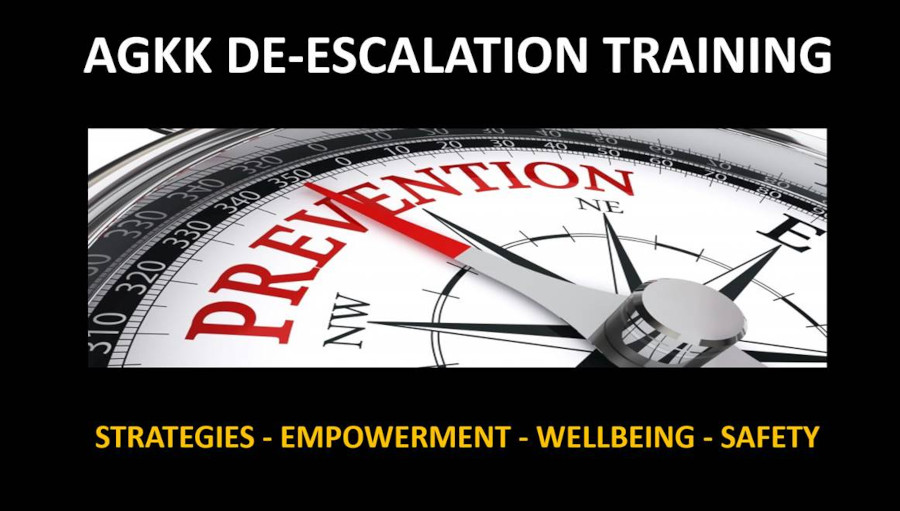De-Escalation Training and OVA training for Teachers & Lectures
De-Escalation Training For Schools
Training Workshops for teachers with the proactive management of aggressive or violent students
Teacher de-escalation training FACE-TO-FACE workshops and courses for teachers and schools
This de-escalation workshop, course, program is designed to assist teachers and lecturers to recognise when a student or individual is becoming distressed or when their behaviour is escalating, and the de-escalation training, OVA training provides a set of tools and strategies to respond in ways that are likely to result in more positive outcomes for teachers and students when they are faced with aggression or violence in the workplace.
De-escalation Practical Training that provides immediate solutions to occupational violence and aggression
AGKK PRACTICAL DE-ESCALATION TRAINING BUILDS…
🔴 CONFIDENCE OF TEACHERS AND ALL SCHOOL STAFF
🔴 IMPROVES AGGRESSION MANAGEMENT SKILLS OF TEACHERS
🔴 ENHANCES SAFETY, WELLBEING OF TEACHERS, STUDENTS & PRODUCTIVITY
🔴 IMPROVES OCCUPATIONAL VIOLENCE PREVENTION FOR TEACHERS
🔴 REDUCES ANXIETY
Working intelligently together we EQUIP, EMPOWER & EDUCATE teachers and schools with…
Contextual, Proactive, Appropriate, Lawful, Safer Responses when faced with high intensity students who display Aggression and Violence.
✅ De-escalation Practical Training that provides immediate solutions to teachers and schools for occupational violence and aggression
For duty of care requirements, it is essential that teachers learn appropriate controlled, measured management responses when they experience the stress of violence and aggressive in the school classroom, playground or any workplace environment.
“We provide practical, face-to face training we create job specific, real world school and teacher training stimuluses that improve safety and strategic management skills in the de-escalation of workplace violence and aggression within a safe and supportive environment.”
Our training is unique and industry leading, having been formed from a combination of 40 years within Primary, Secondary and Tertiary Education as well as staff safety and a wide range of experience in a cross-section of industries.
The practical de-escalation training builds confidence, self-control management skills of teachers and all school staff which enhances safety, wellbeing and productivity.
We welcome all schools, universities & organisations to employ our de-escalation training.
We are always supportive and dedicated with our custom-made de-escalation training.
CONTACT US ANYTIME – 7 DAYS PER WEEK
Directly on 0409474494 or use this Inquiry Booking Form
In our practical de-escalation training for teachers we provide strategies for staff to employ techniques that support the student to return from a distressed and escalated state, back to calm.
AGKK Practical De-Escalation Training has many Benefits Your School & Staff
🎯 Equip, Educate and Empower your staff with empathetic listening skills.
🎯 Demonstrate and advance the skill set for teachers with the most effective communication to use when a student is elevated, angry or upset.
🎯Train staff how to conduct themselves in a way that reassures the distressed student and helps them become more relaxed and calm down.
“In schools and classrooms recognising when a student’s behaviour is escalating and responding appropriately and early to address their concerns are essential in reducing the impact of the behaviour and keeping staff and students safe.
If a student’s behaviour is escalating but is not placing them or others at imminent risk of physical harm, school staff should employ proactive, practical de-escalation strategies to prevent behaviours from further escalation and to address the cause of the escalation.”
AGKK de-escalation training educates teachers to use practical teacher strategies for de-escalation of aggressive or violent students :
✅ Reinforce the desired student behaviour or positive alternate behaviours when demonstrated. Using active listening techniques (e.g. LEAPS – Listen, Empathise, Ask questions, Paraphrase and Summarise actions for moving forward).
✅ Training teachers to embrace a non-threatening body stance and body language (open, relaxed with hands down). Allowing adequate personal space for safety and not elevating the distressed or angry student.
✅ Teachers keeping verbal instructions simple and minimal, using a calm tone of voice and clear, direct language or student’s preferred method of communication (focusing on the behaviours you want them to display rather than reinforcing the ones you do not.
✅ Recognising and acknowledging the student’s underlying or expressed emotion (e.g. anger/ distress). Teachers providing take-up time for students to process verbal prompts or requests. Problem-solving with the student to address the cause of escalation if it is safe to do so.
✅ Teachers can provide options (within limits) to help the student feel they are still in control of their decisions. Allowing the student to access an alternative space with school staff that is less stimulating or removes access to the triggers of aggressive behaviour in order to problem solve or regulate.
Important: Effective de-escalation is dependent on the individual needs of the student at the time. If teachers are not careful, sometimes what teachers say or do can maintain or strengthen the aggressive behaviour.
🎯 It is essential that staff learn appropriate controlled management responses when they experience the stress of violence and aggressive in the workplace.
🎯 In our practical, face-to face training we create job specific, role play stimuluses that allows staff to practice an automatic proactive response to improve safety and strategic management skills in the de-escalation of real world workplace violence and aggression.
Our training is unique and industry leading, having been formed from a combination of 40 years within the Tertiary Education as well as Public Safety and a wide cross-section of industries.
🎯 In our practical training we practice and condition staff with the confident de-escalation skills needed that provides immediate solutions that they can use in the workplace each day.
Apart from the obvious development of proactive de-escalation skills, the practical training builds confidence, self-control management skills of staff which enhances safety, wellbeing and productivity.
We welcome all schools, universities & organisations.
We are always supportive with our custom-made de-escalation training.
CONTACT US 7 days per week.
We are here to assist you with your inquiry booking today!
Have a question or require further information?
You are welcome to phone Bernie Directly on 0409474494 or use this inquiry booking form
Training in AGKK de-escalation workshops will provide your organisation and your staff the foundations for safer aggression management and prevention of violence in the workplace.
AGKK de-escalation training for teachers and schools provides effective, proactive strategies for the effective management of aggressive students and the prevention of student violence
In our de-escalation training we educate school staff and university lecturers to respond effectively and safely to aggressive or violent student behaviour. In our de-escalation training we train and educate teachers and all staff to stay calm, manage their own responses, prevent physical confrontations, and provide many more practical solutions that are specific to their school environment and students.
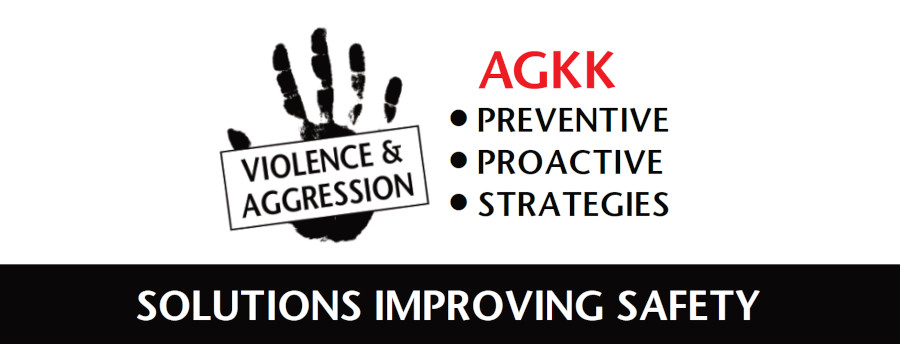
Bernie Haughey the founder and chief instructor is highly experienced educator and competent in training teachers to create well educated, balanced, mindful well respected, productive and calmer students.
As a trainer and educator Bernie is respected in his ability to practically demonstrate to teachers how to connect positively and manage even with the most difficult students and teaching staff proactive de-escalation skills that can provide immediate results in improving teacher confidence, safety and wellbeing.
Bernie previously working as a teacher for decades and now as a de-escalation trainer is passionate in helping teachers in their development of de-escalation skills, management knowledge and positive outcomes.
Bernie is down to earth, hardworking and has the ability to train all staff effectively.
He thrives on challenges and opportunities to share over 35 years of teaching experience and proven training education to enhance teacher de-escalation skills when managing and teaching aggressive or violent students.

CONTACT US ANYTIME – 7 DAYS PER WEEK
Directly on ☎ 0409474494 or use this inquiry booking form
You are most welcome to contact Bernie to discuss your specific objectives and desired outcomes for Teacher De-escalation training, De-Escalation Training For Schools, courses, programs, OVA training, Violence management prevention training.
What really works when it comes to de-escalating anxious, hostile, or challenging behaviour from school students or university students?
How you respond to the behaviour is often the key to defusing it.
AGKK de-escalation training for teachers and lectures has decades of solution based management techniques that work in the real classroom and school environments.
AGKK De-Escalation training for teachers is filled with simple and effective strategies to help teachers manage aggressive students and prevent and deter violence.
In our de-escalation training for staff and teachers we educate and train staff to:
- Stay calm and confident
- Proactively manage and strategically control their responses.
- Set positive limits.
- Manage and deal with challenging questions and aggressive behaviour
- Strategically prevent and effectively control physical confrontation.
“The teacher de-escalation courses, training workshops will be very engaging and practical and your staff team will be able to ask for advice on how to proactively deal with real-life instances of aggression and violence in the classroom, school environment and workplace.
In the interactive de-escalation training teachers will learn safe disengagement techniques and effective verbal communication for de-escalation, which will allow teachers and all staff to practice them in a safe environment, and provide staff with constructive feedback for very useful solutions.”
![]()
CONTACT US ANYTIME – 7 DAYS PER WEEK
Directly on ☎ 0409474494 or use this inquiry booking form
You are most welcome to contact Bernie to discuss your specific objectives and desired outcomes for Teacher De-escalation training, De-Escalation Training For Schools, courses, programs, OVA training, Violence management prevention training.
Aggressive Behaviour Management, Risk Management training and Staff Safety Self Defence disengagement training solutions & for your school, university, organisation and staff.
We are here to provide solutions which improve teacher and staff confidence, safety and wellbeing with our proven de-escalation training, courses, workshops and practical interactive training for your teachers, staff, schools or organisations.
ADVANCED BOOKINGS RECOMMENDED
TOUCH BASE ON THE PHONE 0409 474 494 TO FAST TRACK YOUR REQUIRED SAFETY OUTCOMES
It is important to touch base on the phone so are able to fast track and establish your specific training requirements and desired outcomes for your staff and organisation.
PRACTICAL DE-ESCALATION TRAINING & OVA TRAINING COURSES FOR TEACHING STAFF
Based on very experienced strategies developed in the passive management of the aggressive student we practically train staff with techniques that will help staff respond to difficult behaviour from students in the safest, most effective ways possible.
Bernie Haughey has over 35 years’ experience as a life skills coach, de-escalation trainer and a very experienced school teacher.
He promotes high quality learning opportunities and the enhancement of positive practical outcome solutions for teachers when they are faced with aggression or violence from students. The de-.escalation training helps enhance a positive proactive school culture.
Previously as a school teacher, educator and trainer who has worked in the community at this level for decades, he can guarantee that school work, and initiative and controlled classroom behaviour can be greatly enhanced through the de-escalation workshops, courses and programs, delivered in an experienced, positive and professional environment.
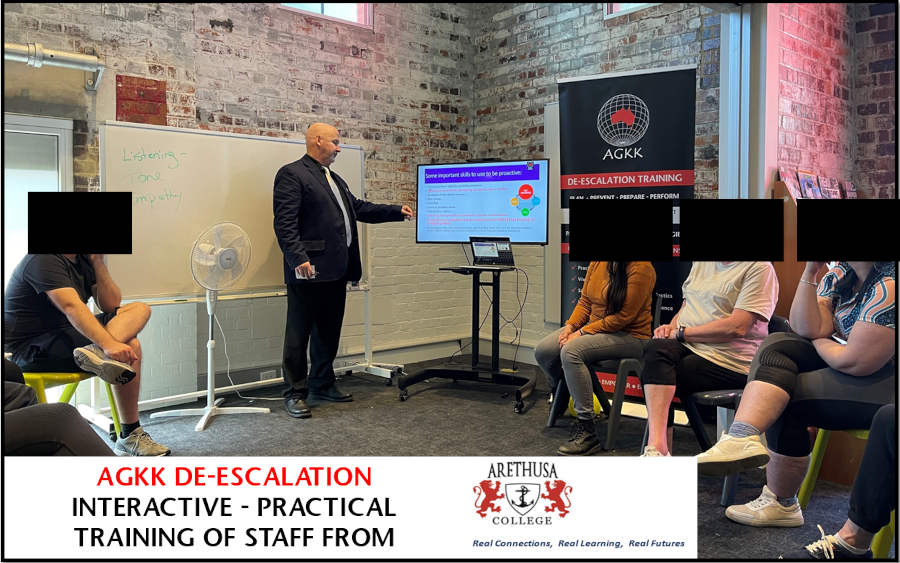
TESTIMONIAL
We recently had de-escalation practical, interactive training with AGKK at two of our locations. Our presenter was Bernie Haughey.
I was very impressed with Bernie’s commitment and desire to provide us with the most appropriate training for our workplace contexts.
I had several phone calls with Bernie prior to the training event, and he asked insightful questions about the nature of our work in order to determine the areas where we most needed training.
Many of our staff are required to visit clients in their homes and Bernie was able to modify the training for that context.
To further provide us with bespoke training Bernie arrived early so that he could meet our staff and talk about their experiences and where they had areas of concern.
The training itself was an ideal mix of theory and interactive practice. Everybody had a chance to practice the skills that Bernie expertly taught us. The principles were simple but highly effective.
Feedback from our staff was uniformly excellent. Best of all, our staff now feel a lot more confident about how to de-escalate a situation and thereby ensuring the safety and wellbeing of all concerned.
I whole-heartedly recommend the de-escalation interactive training with AGKK. As evidence of my recommendation, we have already booked Bernie in for refresher training at the start of 2023.”
Peter McAloney Arethusa Colleges
We train teachers and all staff to minimise behaviours that may lead to physical harm or danger to self or others by acting early — immediately before or as behaviour begins to escalate.
Ignoring escalation and elevated students and not addressing its cause can increase the frequency and/or severity of the behaviour.
Therefore, it is important for teachers to be trained to practically identify the triggers that cause concerning behaviour and to recognise the early signs of escalation. The practical de-escalation training provides an opportunity to apply strategies that reduce, rather than heighten, an emerging situation of a student who is aggressive or violent.
![]()
TAILOR-MADE PRACTICAL DE-ESCALATION TRAINING FOR TEACHERS, WORKSHOPS AND COURSES
The tailor-made de-escalation training provides teachers with an effective foundational framework for proactive de-escalation.
The interactive de-escalation training provides schools, organisations, teachers and individuals the skills and resources needed for optimal de-escalation to prevent many Occupational Violence and Aggression incidents from occurring.
![]()
DELIVERY
OF DE-ESCALATION TRAINING WORKSHOPS AND COURSES:
Usually our custom made interactive de-escalation training is delivered in person, at your school, university, organisation or venue.
![]()
LOCATIONS
OF DE-ESCALATION TEACHER TRAINING WORKSHOPS AND COURSES:
Training Australia Wide.
![]()
TARGET AUDIENCE
OF DE-ESCALATION TRAINING WORKSHOPS AND COURSES:
All teachers, staff and managers facing workplace aggression, conflict or violence.
![]()
TRAINING GROUP SIZE /CAPACITY
OF TEACHER DE-ESCALATION TRAINING WORKSHOPS AND COURSES:
Can be up to 50 people for each training de-escalation workshop.
(We are flexible to accommodate your needs)
![]()
COST
OF DE-ESCALATION TRAINING WORKSHOPS AND COURSES:
Upon request and to be discussed based on your needs and training requirements.
TOUCH BASE ON THE PHONE TO FAST TRACK YOUR REQUIRED SAFETY OUTCOMES
It is important to touch base on the phone so are able to fast track and establish your specific training requirements and desired outcomes for your staff and business
Phone Bernie 7 days per week on 0409 474 494 or use this inquiry booking form
I am passionate and dedicated I trust that my experience and practical proven performance assists your business and staff.
![]()
DURATION
Tailor-made de-escalation practical training, courses and programs can be
🔴 2 hour intensive interactive workshop
🔴 Half Day interactive Training or
🔴 Full Day interactive training for workplaces and teachers, staff, businesses and other organisations.
These de-escalation workshops and courses can be adapted to fit with your school, university and organisations timeframe.
It will meet your specific training requirements and desired practical outcomes.
Advanced Bookings Recommended
![]()
I can travel to your location Australia wide
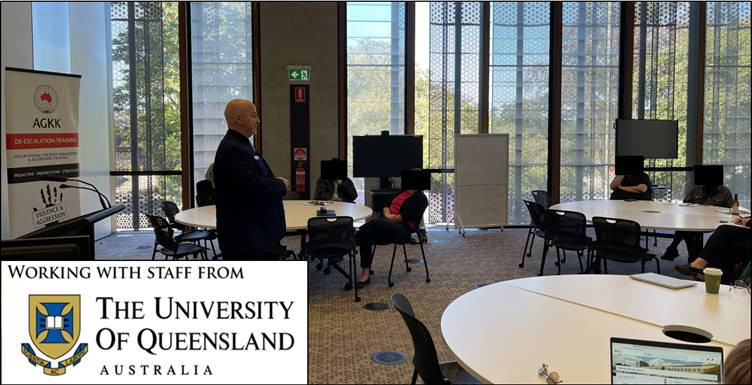
AGKK de-escalation practical training is dedicated and committed to providing its clients with occupational violence and prevention de-escalation training of the highest calibre and assisting schools and teachers to mitigate security risks within their work environment for their staff.
Teacher and staff confidence and tactical knowledge will improve to deter and prevent occupational violence and aggression.
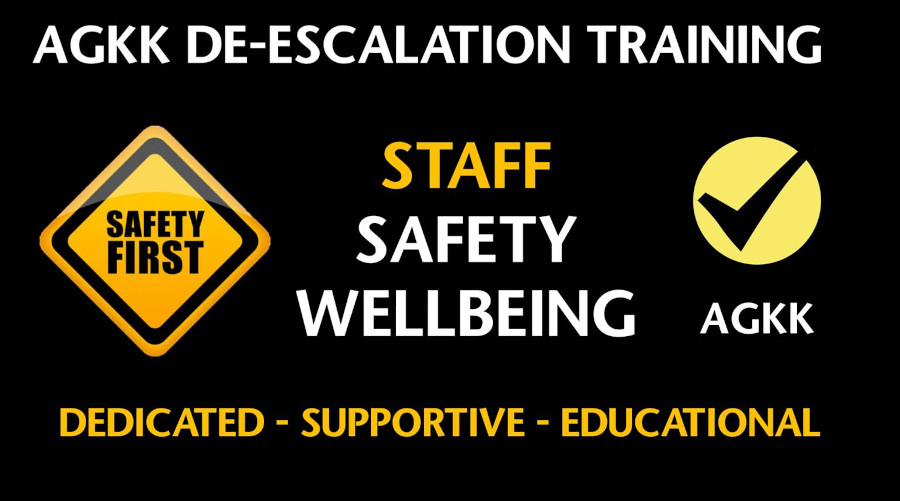
Teacher de-escalation training techniques examples include:
✅ Offer a sympathetic ear
✅ Remain calm
✅ Listen to the student fully
✅ Be prepared for any situation
✅ Try to understand the student in their frustration
✅ Ask for additional information, ideas that will help you resolve the issue quicker
✅ Behave professionally
✅ Offer and work through solutions as soon as possible with the student
Teachers knowing how to de-escalate situations, understanding the process and de-escalation techniques improves the wellbeing and safety for teachers and students.

Some recognised and practical de-escalation management strategies for teachers and lecturers include:
🎯 Keep verbal instructions simple and minimal, using a calm tone of voice.
🎯 Use clear, direct language or the student’s preferred method of communication (focus on the behaviours you want them to display rather than the ones you don’t).
🎯 Reinforce the desired behaviour or positive alternate behaviours when demonstrated.
🎯 Acknowledge the student’s underlying or expressed emotion (e.g. anger/distress/sadness).
🎯 Use active listening skills.
🎯 Provide take-up time where, strategic silence can help a student absorb the information and be calmer
🎯 Be aware of body language (adopt a non-threatening stance – open, relaxed and hands non-threatening.
🎯 Problem-solve with the student to address the issue if it is safe to do so.
🎯 Allow adequate personal space.
🎯 Use non-verbal cues.
🎯 Provide options (within the limits) to help student feel they are in control of their decisions.
🎯 Allow the student to access an alternative space with school staff that is less stimulating or removes access to the triggers of behaviour in order to self-regulate and problem-solve. (Note: passive management of the student is important)
Important: Effective de-escalation is dependent on the individual needs of the student at the time. If staff are not careful, sometimes what they do to de-escalate can maintain or strengthen the behaviour (e.g. using an alternative work area, or break-away space, when a student finds particular work difficult may reinforce escape or aggressive behaviour.)
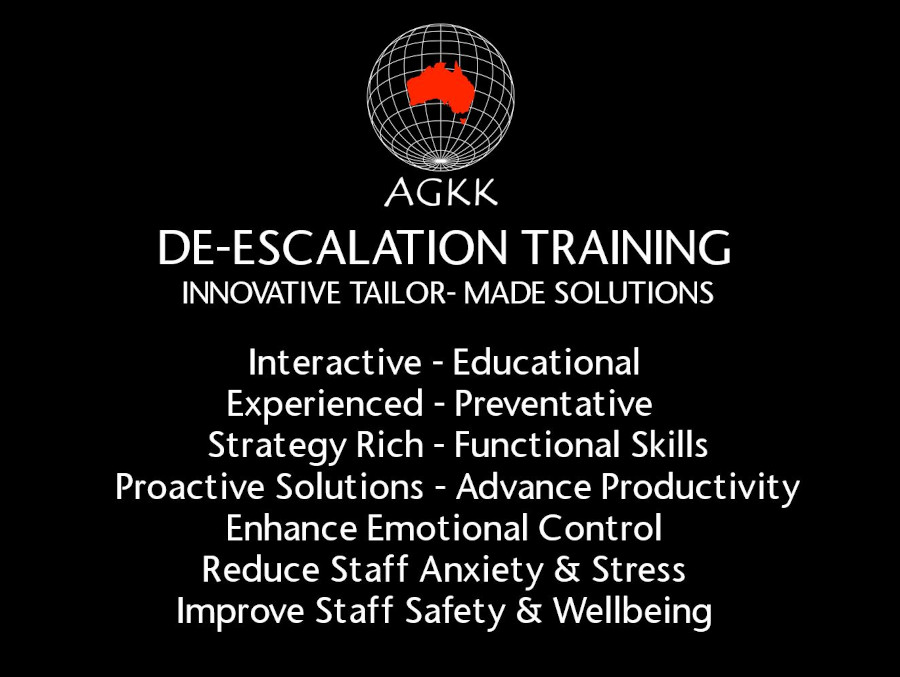
Teachers are trained to give the student time to regain their calm: Say, “I notice you’re really upset. Let’s work together on breathing slowly for one minute in order to manage a good outcome.”
Direct the student to be aware of their thoughts and feelings: Say, “Tell me how you feel and what you’re thinking, and if you’re ready to focus on moving forward with getting calm.”
Have the student redirect their thoughts: Say, “Take a minute, close your eyes, breathe slowly, and think about something that makes you happy. For example – I know you told me how much you like fishing. Think about walking to the beach in a calm state of mind as you smell the ocean, and feel the warmth of sun and the sea breeze.”
We train staff to give the student positive feedback on becoming calm: Say, “Now open your eyes. How are you feeling? If you need more time to settle down, let me know. Would you like a drink of water?”
In our de-escalation training for teachers we educate staff with practical strategies examples include providing students with a little more time to refocus: An example statement “Take a minute to take some time out, take a few deep breaths and rethink better options.”
Teacher communication for student reflection for the future. Example “The next time you’re feeling this way and I’m not with you, what can you tell yourself in order to take charge of your thinking and behaviour, and get yourself to a better, regulated place?”
In our training workshops we educate staff how proactive de-escalation strategies can reduce disruptive student classroom behaviours
Using specific practical de-escalation approaches matched to the phases of a classroom behaviour crisis management can help schools prevent or respond to intense situations from aggressive or violent students.
Teachers learn to recognise signs of distress and gain a broad range of tools to help them intervene early to prevent conflict and escalation. The workshops, courses and program is based on the latest principles in adult learning with an emphasis on simple real world student management strategies that can be immediately used by your entire staff. The de-escalation training provides staff practical solutions. The de-escalation training workshops/courses/programs for teachers and lectures is also based on decades of experience and on the latest research and includes approaches that have a proven track record of effectiveness and provides teachers and lecturers with immediate de-escalation solutions.
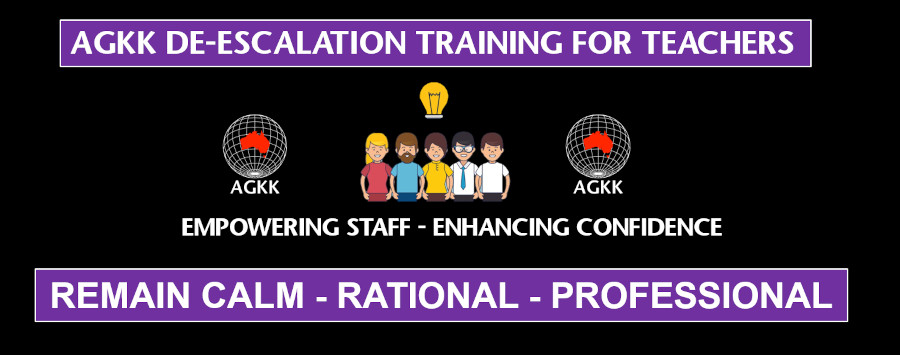
Below are some strategic tips and de-escalation techniques for teaching that are useful when considering the language teachers can use with pupils and students when they are in a heightened state:
Techniques and strategies for teachers/ lectures in the proactive de-escalation of school and university students
🔴 As teachers and lecturers try your best not to take the abuse personally. This is an important skill and is very important in de-escalation of aggressive or abusive students.
🔴 Be strategic when to validate emotions. This takes practice but can be done if you have a class of three or a class of 30 or more. If you see a student/pupil struggling, validating their emotions in that moment will get you the space to deal with the issue later on. If a pupil is visibly angered or upset as the lesson starts, rather than quickly addressing them with the school behaviour policy or threatening them with a “warning”, it is much more effective to say, “I can see you are upset at the moment, but just give me two minutes to get the lesson started and I’ll come and assist/help you.”
🔴 Reduce escalation of the situation when a student is elevated. A big focus for us has been around minimising the dramatic nature of incidents through our language and actions, rather than feeding the situation/drama further. If you really need to “vent” about a situation with a pupil, ensure that this is done out of sight of other pupils and try to choose your words carefully. The words you use about a child can often alter your own perception of that child, especially if you do not manage to resolve the issue that you had with that pupil. An experienced teacher/ lecturer in de-escalation conveys to the student it is their actions not them as a person that is the issue for positive controlled behaviour improvement.
🔴 There are boundaries around behaviour in de-escalation. As teachers/ lecturers always be professional, calm, respectful and rational.
🔴 If you call on a teacher/lecturer colleague or school/university senior leader to support, do not berate the student or pupil in front of that colleague. If you see a colleague dealing with a pupil and it is not going well, do not be afraid to offer to support. Sometimes a new face and support person can put a positive impact on the situation and will allow the student to connect and regulate their behaviour with a new member of staff.
🔴 Pupils and students will often struggle to be reasonable when they have moved outside their controlled behaviour. Timing of strategic de-escalation communication is key to positive solutions when going back to a pupil to reflect on behaviour that may not have been favourable.
🔴 We educate teachers/ lectures with trauma-informed language.
🔴 Listen to the language used by colleagues in the corridors, in the staffroom and about the school. The best teacher/lecturer practitioners select their words, tone and timing carefully and are adept at reducing anxieties and de-escalating behaviours because of how they connect with a student through the use of effective de-escalation language, techniques and strategies.
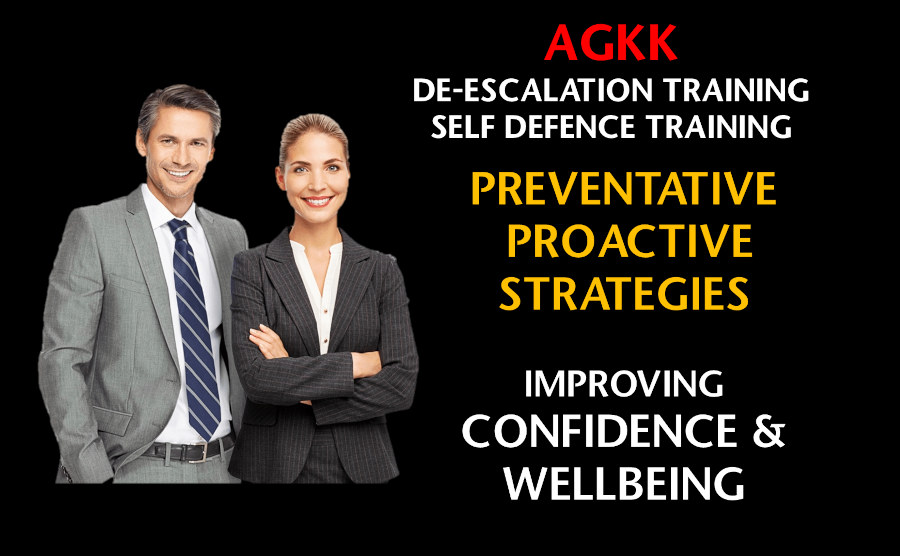
Self Defence For Schools, Colleges and Universities
De-escalation training and Self Defence training for teachers, students and lectures
At AGKK de-escalation training for teachers we educate and train all teachers and lecturers with practical strategies for the effective management of working with students who display aggression and violence.
Incidents of student aggression and violence in the classroom, school playground or any school environment should be met with immediate, nonaggressive management strategies.
“At AGKK de-escalation training we educate teachers with specific strategies for preventing and managing student aggression or violent episodes and how to remain calm, rational, professional and react appropriately when they do occur.”
We train teachers with proactive School-Based Interventions for Aggressive, Disruptive or Violent Behaviour from students.
School teachers should be trained to have practical skills and have proactive management intervention strategies to prevent student violence or reduce student aggressive behaviour.
Bernie, the founder and chief instructor has more than 36 years of experience as a leading teacher and educator.
At AGKK de-escalation school teacher training we emphasise the importance of appropriate intervention early in the school student aggression or violence cycle-before the behaviour escalates to destructive and dangerous levels to improve the safety of students and teachers.
There are key teacher de-escalation strategies for effectively responding to aggression and violence from school students.
We educate and train teachers to have a tactical mindset so they are more astute in assessing behaviour and preparing for possible violence and aggressive student incidents. Examples include recognising the warning signs of a aggressive or violent episode, and developing individual student management strategies.
We train teachers in becoming more aware of early warning signs of violent student episodes.
This de-escalation skill set is essential in recognising cues, signals, or other stimuli that usually precede a violent episode may help to prevent a crisis.
These early warning signs will differ from student to student, but may include any or several of the following: turning red, clenching fists, cursing, crying, sudden silence, glaring, narrowing of eyes, hyperventilation, increase in heart rate, strange noises, darting eyes, no conversational language, questioning, arguing, and verbal abuse or any other extreme change in behaviour are important indicators of escalating crisis behaviour.
We train teachers with effective management actions to take to prevent a crisis and also educate staff to reflect and evaluate whether previous management actions were effective.
We train staff with effective, practical and specific classroom management strategies aimed at prevention of aggression and violence include
🎯Establishing reasonable norms and expectations
🎯Avoiding confrontation
🎯Minimising competition
🎯Using nonverbal signals and reminders
🎯Providing desirable backup reinforcers
🎯Intervening early (before the onset of aggressive or violent behaviour)
We train teachers how to play the role of “calm, cool, and composed.” Acting in this manner actually helps the student to remain calm.
✅ Be assertive and directive but not aggressive. Do not threaten the student verbally or physically.
✅ Be as nonintrusive and non-invasive as possible. Do not move toward the student or invade his or her space.
✅ Communicate expectations verbally and nonverbally. In most situations, tell the student to stop (with an accompanying hand signal) and give a directive statement.
✅ Send for help and get rid of the audience (the rest of the students).
✅ Wait for assistance (if possible).
✅ Do not argue and do not respond to verbal abuse.
AGKK VIOLENCE PREVENTION AND WORKPLACE DE-ESCALATION TRAINING FOR STAFF, TEACHERS AND LECTURES IN SCHOOLS & UNIVERSITIES
We provide all school staff and all university staff with the confidence and safe proactive strategies to deal with and manage escalating situations:
🎯 Recognise aggressive behaviours and why they may occur in a workplace or school setting.
🎯 Consider measured or learned safer responses, as opposed to a defensive reaction, to defuse a potentially threatening situation (proactive tactical techniques).
🎯Consider the step-by-step process of de-escalation, listening, passive communication, as effective de-escalation strategies in conflict and aggression situations.
🎯 Identify, discuss and apply communication tools and techniques to create a non-threatening environment and more positive responses and outcomes.
🎯 Remove communication barriers (such as passive aggression) and develop dynamic listening techniques and strategies.
Teachers recognise and consider progressive communication techniques such as clarifying the implied, distraction and delay, negotiation, and safe disengagement techniques.
Develop ‘proactive verbal communication responses’ as a controlled response strategy.
Staff improving their skill set in identifying and addressing the triggers of conflict, aggression or violence.
“At AGKK de-escalation training for teachers we provide effective practical education for teachers about how to recognise the early signs of dysregulation in all students, and specifically at-risk students.
We provide teacher training and create a set of de-escalation strategies that can be used to turn down the heat when one or more students begin to exhibit aggressive, violent or dysregulated school student behaviour.”
At AGKK de-escalation training for teachers we are here to help schools, teachers and all educators during these most challenging of times.
CONTACT US ANYTIME – 7 DAYS PER WEEK
Directly on 0409474494 or use this INQUIRY BOOKING FORM
As teachers, it is our job to guide our students to constructively expressing themselves while ensuring the environment of the classroom or lecture room stays positive and productive. Even the best and experienced teachers can still learn new and useful de-escalation skills, that’s where classroom de-escalation training for teachers comes into play in providing practical, preventative, professional solutions for aggressive or violent behaviour from students.
Through this practical De-escalation training, teachers will have the necessary skills to diffuse tricky situations without being overwhelmed.
De-escalating classroom situations with proactive techniques is the best approach to take. When teachers are exposed to aggressive or violent behaviour from students, when tensions are high it can be very difficult for teachers to maintain control of these situations. We provide clear de-escalation management strategies and solutions that work for teachers.
Effective Communication in the classroom is essential for teachers
Through the de-escalation training with AGKK, teachers will learn a multitude of useful and practical skills about maintaining a peaceful, productive classroom.
“Teachers will learn how body language plays a big part in whether a situation will diffuse or explode, how pointing can be perceived as threatening, poor communication skills, bad use of tone and voice modulation, entering someone’s personal space can cause them to panic quickly and many more vital points to manage aggressive or violent students.”
In our de-escalation training for teachers we reinforce the understanding of the Psychology of children and their developing behaviour.
Students in the classroom are all coming from their own personal backstory from varied environments. When students experience a stressful situation, their body releases the stress hormone cortisol, which (while extremely helpful in certain circumstances) takes away proper mental reasoning power.
Situations that cause stress to children, teenagers and young adults can be very unpredictable. In our de-escalation training for teachers we reinforce the right amount of skill and patience from the teacher. However, most teachers receive little to no training in the techniques of conflict resolution. Traditional training programs for teachers usually offer a one-size-fits-all approach towards resolving conflict with students, but those typical strategies do not work for every student. AGKK de-escalation training aims to broaden the skill set on handling rising tensions in classrooms.

IN OUR DE-ESCALATION TRAINING FOR TEACHERS WE EDUCATE AND TRAIN STAFF IN THE IMPORTANCE OF LISTENING
Listening is a powerful tool. When students think that teachers have not listened to their concerns, they will almost invariably see teachers as not part of the solution.
IN OUR DE-ESCALATION TRAINING FOR TEACHERS WE EDUCATE AND TRAIN STAFF IN THE IMPORTANCE OF CONTROLLED BODY LANGUAGE
Teachers controlling tone and body language in important in de-escalation
A significant portion of the message people receive from you in face-to-face de-escalation communication is conveyed through your body language and your voice tone. If you look threatening, you are threatening. If you want to de-escalate a conflict, remember to control your tone and body-language.
IN OUR DE-ESCALATION TRAINING FOR TEACHERS AND LECTURES WE TRAIN TEACHERS THE IMPORTANCE OF AWARENESS AND FORWARD PLANNING ARE ESSENTIAL IN REDUCING AGGRESSION AND VIOLENCE FROM STUDENTS
Anticipating potential conflict is important for preparedness, and there are many verbal and non-verbal cues to be mindful of as situations unfold.
In our de-escalation training for teachers we educate staff some signs of conflict escalation:
🔴 A student clenching his or her fists or tightening and untightening their jaw.
🔴 A sudden change in body language or tone used during a conversation.
🔴 The person starts pacing or fidgeting.
🔴 A change in type of eye contact.
🔴 The “Rooster Stance” – chest protruding out more and arms more away from the body.
🔴 Disruptive behaviours – Such as yelling, bullying, actively defying or refusing to comply with rules.
So what can teachers or lectures do in order to help de-escalate a conflict situation?
Here are some tips for teachers and lectures, and remember, this isn’t a step by step list, but rather a menu of options that may prove useful…
And remember, without specialised training; never consider the use of physical force as your first response.
✅ First, calm yourself before interacting with the person.
✅ If you’re upset, it’s only going to escalate the situation. Calm down and then begin to look at the situation and how you can intervene safely.
✅ Take a deep breath.
✅ Use a low, dull tone of voice & don’t get defensive even if the insults are directed at you.
EQUIP – EMPOWER – EDUCATE WITH DE-ESCLATION TRAINING FOR TEACHERS
Our de-escalation face-to-face training workshop sessions are clearly articulated with established procedures, promoting high quality opportunities and the enhancement of professional culture to increase mindfulness, proficiency of teachers in dealing with aggressive students, reducing stress and anxiety. We train teachers to improve management of student engagement for learning, resilience, and proactive management behaviours.
We offer de-escalation training workshops, courses and programs for teachers and schools throughout Australia.
Our proven approach to de-escalation training gives teachers and lectures immediate benefits and solutions for practical de-escalation techniques for the effective management of student aggression and violence prevention.
Aims of de-escalation training for teachers
In our de-escalation training our aim is to provide teachers, lectures schools and universities with the skills and resources needed for the effective and proactive, practical management skills to maintain an optimal learning environment enabling teachers and lecturers to enhance respectful, disciplined, confident, resilient, mature and courteous students.
In our de-escalation training for teachers they develop the necessary skills to encourage students to be calm and focused and to reflect on choices through visualisation, calming communication and self-evaluation techniques.
We train and provide teachers with valuable de-escalation skills that are very useful to redirect students to have more positive behaviour that will lead students to reach their full potential.
This innovative, practical, job specific de-escalation training, OVA training workshops, course, program for teachers, lecturers, schools and universities is designed to give staff the proactive, real world skills needed to passively de-escalate the aggressive or violent student or individual.
We usually travel to conduct the contextualised de-escalation training and OVA training within your school, university or remote educational learning environment.
We aim to enhance the confidence and de-escalation skills of all teachers and staff across the whole school or university and have a positive educational training de-escalation impact with a more peaceful, safer future for all teachers and students.
In today’s climate many school students are often placed under significant stress through factors including academic pressures, peer group influences, family situations and rapid changes as they progress through adolescence. Many students fail to maintain sufficient physical activity to stay healthy and reduce stress.
Teachers learn practical structured de-escalation strategies that can significantly improve student’s capacity to not be so elevated and help students reduce stress and anxiety.
We are able to customise programs to suit teachers and their student groups depending on their specific needs and give opportunities for students to reach their full potential.
We educate teachers in improving students on life skills, protective behaviours and conflict resolution to help them avoid problems arising in the first place.
Bernie Haughey the founder and chief instructor has over 35 years’ experience, he conducts de-escalation workshops, programs, courses at schools throughout Australia.
The format of de-escalation workshops, courses and programs offered by AGKK is completely flexible and can be customised to suit the needs of your school, teachers, students, the time available and your desired outcomes. We can offer de-escalation programs ranging from a lecture format to practical well-controlled practical face-to-face de-escalation workshop activities.
De-Escalation Training For Schools, Universities, Teachers and Lectures.
De-escalation Training Strategies for teachers
De-escalation training for schools
We train staff and teachers to respond to aggressive or difficult behaviours in the safest, most effective, practical ways possible. We train staff and teachers with experienced and proven, practical de-escalation training that works in the effective management and prevention of student aggression or violence.
School secretaries, administration officers are all an important part of all school life, dealing with disgruntled parents, aggressive students, to tensions between teachers and colleges-workers.
School, university and teacher de-escalation training will lead to positive outcomes.
Schools and teachers being trained and educated in de-escalation training learn effective de-escalation strategies that provide real world solutions that work in improving safety, wellbeing and safety.
Why Do Schools, Universities, Teachers and Lectures Need De-Escalation Training?
The main objective of applying de-escalation strategies is for teachers and school staff to diffuse the problematic situation enough that it becomes possible to have a constructive discussion aimed towards a positive solution based outcome.
Teachers will learn to recognise the signs of aggression and use de-escalation strategies and de-escalation techniques to diffuse the situation proactively before it erupts and escalates into a conflict or aggression or violence.
AGKK De-Escalation Training Will Benefit Your School, University, Lectures & Staff
It is not natural or easy for teachers to remain calm and professional in a stressful situation. Most teachers or staff members will react with emotion, which will end up fuelling the fire and escalating the problem further.
AGKK de-escalation training for teachers offers de-escalation training for schools that will educate teachers and lectures to diffuse the situation rather than aggravate it further.
AGKK de-escalation training workshops, courses and programs for schools and universities is designed to:
✅ Equip your staff and teachers with empathetic listening skills.
✅ Familiarise staff and teachers with the most effective strategic communication skills to use when students or individuals is upset.
✅ Teach staff how to conduct themselves in a way that reassures the aggressive student, co-worker or individual and helps them calm down and be not so elevated.
Our de-escalation training empowers teachers and social care workers to be confident and maintain safe and respectful strategies for all staff in the de-escalation, prevention and management of aggressive or violent students, patients and individuals.
AGKK De-escalation training – provides teachers and staff with effective and practical classroom management strategies when dealing with aggressive students.
The de-escalation training educates and demonstrates professional teachers and school staff the skills to identify, prevent, and de-escalate crisis in workplace.
We offer solutions for every occurrences for student violence prevention and aggression management.
As teachers and social care workers, every day at the workplace presents new encounters, situations, and a growing increase of aggression in the workplace. Teachers can find themselves dealing with angry, hostile, or noncompliant behaviour every day. Teachers and staff response to this aggressive behaviour plays a critical role in determining whether or not the incident will escalate into a crisis or dangerous situation.
AGKK de-escalation training and OVA training programs, courses and workshops provide strategies and techniques for all teachers and social care professionals, from frontline school or university office staff and teachers, lectures through to reception, security staff and support staff. These de-escalation strategies and techniques focus on the care, welfare, safety, and proactive security of both staff and students with practical solutions de-escalation and aggression/violence prevention approaches.
Teacher de-escalation training programs, courses and workshops are designed to manage workplace conflict risk, aggressive behaviours:
🎯 Prevent escalating behaviours
🎯 Intervene and de-escalate risk behaviours
🎯 Reduce anxiety and improve confidence and maintain wellbeing of teachers and staff
The de-escalation workshops, program and courses is the optimal solution for teaching professionals working in schools, universities, social care, healthcare, hospitals and mobile educators facilities who need to prevent and/or manage aggression or violent situations.
🎯 The training has a focus on safety and prevention, it also teaches staff de-escalation skills that are practical that can put into use immediately.
There are many Benefits of de-escalation training
✅ Recognise & respond to aggressive or violent Behaviour. Teachers and staff learn simple and effective behaviour assessment and decision-making skills to ensure escalation is avoided. Teachers and staff can be faced with aggressive or violent students that places staff or others at risk of injury or escalating stress.
✅ Teachers learn how to safely de-escalate students in their care.
✅ The practical de-escalation training demonstrates to teachers and staff how maximise safety and minimise harm.
✅ The de-escalation workshops, courses and program trains teachers and all staff to respond to conflict situations with a focus on prevention using verbal de-escalation skills and safe disengagement strategy solutions.
Verbal de-escalation training for teachers, lecturers and all staff.
🎯Teachers learn to recognise signs of distress and gain a broad range of tools to help them intervene early to prevent conflict and escalation.
🎯 The face-to-face, practical de-escalation workshop is based on the latest principles in adult learning with an emphasis on simple strategies that can be immediately used by your entire school teaching staff.
🎯 The workshops and de-escalation course has a proven track record of effectiveness in providing solutions and meeting desired outcomes.
IN OUR DE-ESCALATION TRAINING WE EDUCATE TEACHERS TO UNDERSTAND & IMPLEMENT EFFECTIVE FORMS OF COMMUNICATION
In our de-escalation training we train staff both verbal and non-verbal tactics taught at AGKK de-escalation training workshops, courses and programs will aid teachers and the office staff in significantly reducing the number of disruptive aggressive or violent incidents.
Our practical face-to-face de-escalation training will provide teachers and staff with essential information such as:
🔴 What words teachers can use when talking to a distressed student or individual?
🔴 How teachers can listen actively and the tone of voice to speak in?
🔴 How teachers and lectures can maintain the right mindset for the situation and how not to panic?
🔴 How teachers can physically conduct themselves in a non-threatening way?
🔴 How teachers and lectures can safely handle and subdue physically aggressive students and individuals?
Face-to-Face de-escalation Training and OVA training for teachers
The AGKK de-escalation face-to-face workshop, course is an intensive and practical training experience for schools, universities, teachers and lecturers delivered as various delivery time options by your veteran trainer, Bernie Haughey.
✅ Teachers and lecturers will enjoy structured intensive workshops to learn the theory, knowledge and the job specific skills needed to increase confidence and the essential practical de-escalation skills that provide solutions that work in the real world.
✅ Teachers will have the opportunity to see the demonstrated de-escalation skills and practice delivering them with other teachers or staff in contextualised role plays so that all staff can immediately implement the de-escalation skills from the workshops and program upon completion of the OVA workshop, course or program.
✅ De-escalation training for teachers, lecturers, schools and universities can be delivered throughout Brisbane, Queensland and Australia wide.
🎯Practical, face-to-face de-escalation training is integral to building and strengthening knowledge, confidence and teacher skills to prevent and manage occupational violence and aggression (OVA) in the workplace.
🎯 Occupational Violence and Aggression de-escalation (OVA) training for frontline teachers is now available to equip all staff with skills and knowledge they need to recognise and respond to occupational violence or aggression.
The practical training will be focused on de-escalation knowledge and practical skills for a range of students, clients and workplace settings. Whilst the training will be delivered to frontline teachers including principals, front-of-house reception staff, the training is available for all staff as we have extensive experience in training a wide cross section of all workers that will benefit from our de-escalation training.
The de-escalation training is designed for all teaching staff and all frontline workers who are at risk of experiencing occupational violence and aggression, (OVA) in the workplace. Teachers and all staff will explore and apply an evidence-informed training model for de-escalation that promotes a consistent approach to the prevention and management of OVA in high-risk settings.
Teachers and all staff will develop competence to apply de-escalation techniques to manage aggressive and violent behaviour in the workplace. Some of the de-escalation learning outcomes for teachers/staff are:
🔴 Understand the importance of always taking a safety-first approach first
🔴 Develop capabilities in the use of workplace risk assessments to identify triggers and warning signs relating to aggressive behaviour
🔴 To raise teachers and all staff confidence and competence to apply proven de-escalation strategies and techniques to manage aggressive behaviour
🔴 Understand and be able to apply key techniques for responding to OVA during and after an incident
✅ These de-escalation training workshops, courses or programs have been designed to better enable schools and universities to meet their training obligations and ensure an appropriate standard of capability and confidence is maintained in regards to OVA de-escalation skills.
The live training, face-to-face format of these de-.escalation workshop sessions provides teachers and all staff with the practical opportunity for role play, interactive peer-based learning as they encourage staff to engage in the practical application of their developing skills within a safe, controlled learning environment.
School and University Occupational violence and aggression de-escalation training that improves confidence and safety skills of teachers, lecturers and all staff
The practical de-escalation workshops will address the issue of occupational violence and aggression in schools, universities and all the education sectors by reducing inappropriate behaviour and incidents, increasing reporting and encouraging good management and prevention.
How Does AGKK de-escalation training Help Schools, Universities, Teachers and Lectures?
At AGKK de-escalation training, we offer extensive training throughout our various workshops, courses programs, which cover practical techniques that work for teachers and schools in the effective management of student aggression and violence prevention.
The face-to-face training includes practical contextual role-playing exercises to act out simulations of possible negative experiences and provide immediate solutions to meet schools and teachers desired outcomes.
AGKK de-escalation training will help your teachers and staff be prepared with confidence in the event of unexpected conflict, and improve teacher abilities to effectively resolve the issue and move forward positively.
You are most welcome to contact Bernie directly on 0409 474 494 for immediate solutions for the tailor-made de-escalation training that will suit your staff needs and your school needs, university needs or teaching/lecture staff needs.
We teach staff how to de-escalate students or situations when a pupil is angry or agitated?
In our de-escalation training we educate and train staff with strategies in how to de-escalate a situation with an aggressive or violent student: Listen to what the issue is and the students concerns.
Offer reflective comments to teachers to demonstrate that teachers and lectures have heard what students concerns are.
Wait until the student has released their frustration and explained how they are feeling.
We provide multiple de-escalation strategies and techniques that are very practical solutions for teachers for when they have to manage aggressive or violent behaviours from students.
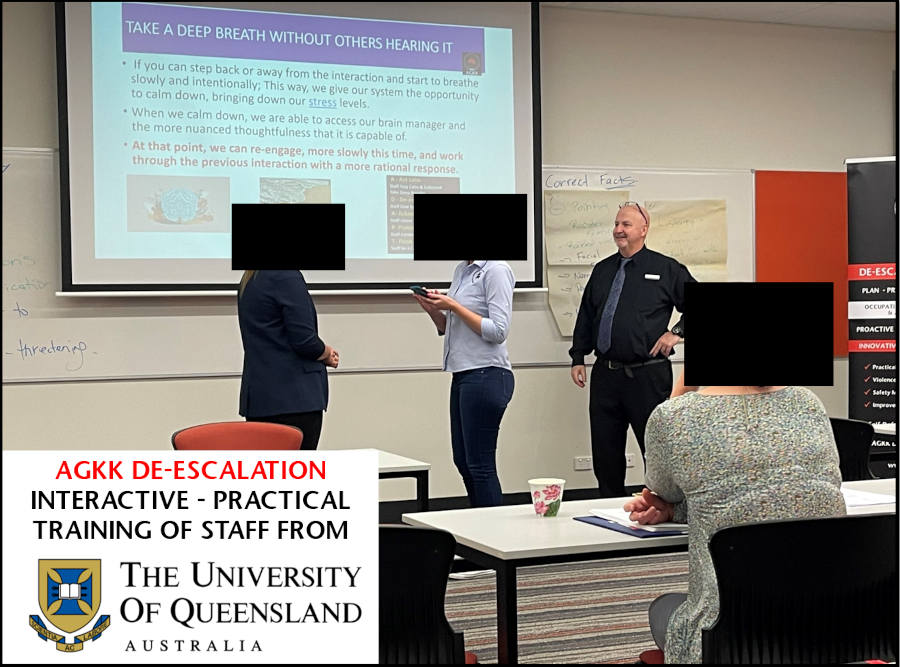
How will AGKK de-escalation training help teachers and lecturers with aggressive students?
Training with AGKK de-escalation will provide teachers/lecturers with the necessary skills to:
🎯 Recognise the signs of conflict arising with students at schools or universities
🎯 Safely dis-engage and deter possibly violent situations and produce more productive outcomes.
🎯 Keep classroom morale high by creating a trusting, proactive learning environment.
AGKK offers de-escalation and conflict training for the teachers, lecturers and other professionals. The training workshops, courses, programs range from workplace conflict resolution to de-escalation and occupational violence and aggression training including safety disengagement Self Defence solutions.
AGKK de-escalation training workshops, courses and programs are fully tailor-made and offer training on a wide array of topics that will prove immensely beneficial for teachers and lecturers in the classroom.
You can contact us directly today on 0409 474 494 to get more information about our de-escalation training workshops, courses, programs and teachers will achieve a well-balanced and proactive learning environment in the effective management of occupational violence and aggression.
Every school year brings new opportunities and challenges, especially with classroom management situations of aggression and violence from students.
Inevitably, situations will escalate in the classroom, such as when students refuse to do work or challenge authority with aggressive or violent behaviour.
In preparation for a new school term or a new school year, and in partnership with AGKK de-escalation training, we are experienced experts in sharing de-escalation strategies and techniques for teachers to help teachers respond effectively when students exhibit challenging aggressive or violent behaviour.
1. In our de-escalation training we train staff to be empathetic and nonjudgmental.
Try not to judge or dismiss students’ feelings when they’re in distress. Remember that their feelings are real, whether or not we think those feelings are justified (e.g., Is this homework really ruining your life?). Respect those feelings, keeping in mind that whatever the student is going through could be the most important event in their life at the moment. Also, the root of the student’s struggles might not be in the assignment homework. Chances are that the student is upset about something else and needs our support and encouragement.
2. In our de-escalation training we train teachers to avoid overreacting.
In our practical face-to-face de-escalation teacher workshops we teach staff how to stay calm, rational, and professional with practical strategies that work in the real world. While we can’t control students’ independent behaviour, how we respond to it has a direct effect on whether the situation escalates or defuses. Positive, confident thoughts like “I can handle this” and “I know what to do” assist teachers to maintain being rational rationality and strategically calm students down. We educate teachers to take a minute, take some deep breaths and to gather their thoughts. When we pause, we prepare ourselves to proactively respond rather than react to classroom conflicts.
“All students look to teachers to set the positive tone in a structured classroom environment,” says Bernie Haughey, a former high school teacher and a veteran teacher with more than 35 years’ experience. “I teach teachers to focus on what they can control, and highlight the positives, proactive steps that are needed for favourable student and school outcomes. If teachers highlight the negatives, fear and anxiety will be more widespread.”
3. In our de-escalation training we train teachers to set positive realistic goals and limits.
One of the most helpful things we can do when a student is misbehaving or acting out in class is to give them respectful, simple, and reasonable limits. If a student argues with us, we might say, “I care about you but your actions are getting in the way. I’ll be happy to discuss this with you as soon as the swearing stops, it is getting in the way of me helping you.” When a student yells, we can try saying, “I’ll be able to listen as soon as your voice is lowered.” If a student won’t do their work, we set a positive limit and say, “After your work is done, we will have five free minutes to have a quick chat.”
4. In our de-escalation training we train staff to strategically ignore challenging statements.
Sometimes when a student’s behaviour is escalating, they can challenge teacher’s authority. They might say things like “You are always picking on me!” or “You cannot make me do anything!” If teachers engage with students who make rash statements or ask challenging questions it is rarely productive. When a student challenges teacher’s authority, redirect their attention to the issue at hand. Ignore the challenge, but not the student. Bring their focus back to how you can work together to solve the problem. So when a student says, “You aren’t my father!” Teachers can say, “Yes. You’re right. I’m not your father. But I am your teacher, and I would like us to work together so you can be successful on this homework assignment.” By teachers being proactive and changing the focus and conveying that as a teacher, you are helping them there are always better outcomes for the student and the teacher.
5. Trained and effective teachers in de-escalation allow quiet time for calming student reflection.
Teachers are taught to wait for at least five seconds after asking students a question so they have time to process. The same strategy is equally effective when students need to de-escalate. Don’t be afraid of some strategic silence. Silence is a powerful communication tool, and it can give students a chance to reflect on what happened and how to proceed. Set up calm down opportunities in your classroom environment where students can regain composure before returning to the lesson.
6. Teachers need to be aware of their body language in de-escalation situations – Teachers will be trained to scan their physical body communication.
When students are pushing teacher’s buttons, what teachers say matters, but also how teachers communicate in voice and body language makes a big difference to effective de-escalation. Teachers can unintentionally co-escalate a student when staff also raise their voice, and our nonverbal communication cues safety, agitation or danger. Crossed arms, a clenched jaw, or hands on hips will not de-escalate. A harsh tone or raised voice won’t help diffuse the situation. When students escalate in class, take a moment to release tension and regain composure so you can show up for your students instead of working against them. Use controlled breathing for a few seconds is very effective in calming teachers before de-escalation of students.
7. Teachers who have confident skills in de-escalation can use language communication statement diffusers to de-escalate an aggressive student.
If teachers are experiencing a power struggle with a student, they can use responses like “good point,” “I hear you,” and “I can understand how you feel” to de-escalate a student. Teachers keeping their tone of their voice as calm as they can during de-escalation is very effective. Make eye contact while giving your student enough personal space to calm down. When you use diffusers, teachers help their students feel seen and heard which a very effective calming technique in de-escalation.
8. The practice of reflective teaching is very important in teachers having proactive outcomes in de-escalation of aggressive or violent students.
As teachers we may find our students pushing the same buttons for a teacher reaction again and again. Each time this happens, it is a good opportunity to practice de-escalation strategies, and then reflect afterwards. The key to teacher self-reflection is to take a comprehensive, unvarnished look at the past, and determine how best to apply those lessons in the future. Reflective practice leads to better outcomes in school or university student de-escalation.
AGKK de-escalation provides effective, proactive strategies for teachers
We train staff to respond effectively and safely to aggressive or violent student behaviour. In our de-escalation training we train and educate teachers and all staff to stay calm, manage their own responses, prevent physical confrontations, and provide many more practical solutions that are specific to their school environment and students.
![]()
CONTACT US ANYTIME – 7 DAYS PER WEEK
Directly on ☎ 0409474494 or use this inquiry booking form
You are most welcome to contact Bernie to discuss your specific objectives and desired outcomes for Teacher De-escalation training, courses, programs, OVA training, Violence management prevention training,
Aggressive Behaviour Management, Risk Management training and Staff Safety Self Defence disengagement training solutions & for your school, university, organisation and staff.
We are here to provide solutions which improve teacher and staff confidence, safety and wellbeing with our proven de-escalation training, courses, workshops and practical interactive training for your teachers, staff, schools or organisations.
ADVANCED BOOKINGS RECOMMENDED

